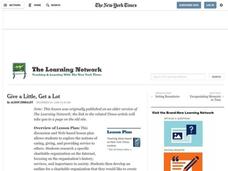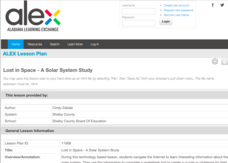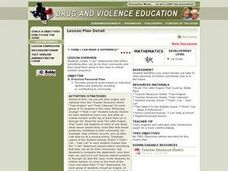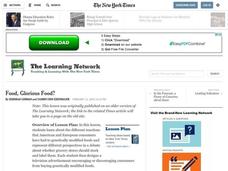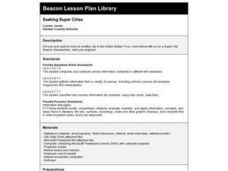Curated OER
Stone Tool Scavenger Hunt
Seventh graders use Internet to familiarize themselves with variety of stone tools used by early man, create information chart describing each tool and its purpose, and discuss why tools have survived thousands of years.
Curated OER
Capital Letters
In this capitalization interactive workhsheet, students read seven sentences and select the proper capitalization for each sentence.
Curated OER
Goddesses Are Personifications Too!
Students explore the use of personification as a way of expressing ideals. They transfer this understanding to the present by creating an allegorical depiction of a contemporary ideal or value inspired by precedents in the Neoclassical...
Alabama Learning Exchange
Do You Have a Babushka?
Young scholars retrieve information about Patricia Polacco from selected sources. They classify information into prescribed categories on a concept map.
Curated OER
Give a Little, Get a Lot
Learners research a specific charitable organization on the Internet, focusing on the organization's history, services, and importance in society. They develop an outline for a charitable organization with a mission statement.
Curated OER
The Right to Know Your Rights
Students read a New York Times article in order analyze the Miranda Rights. They explore various legal views of these rights through group interviews and presentations.
Curated OER
Writing and Research with a Manatee Theme
Students use Internet research methods to find information about manatees. They write a story about a manatee, told through the manatee's eyes, and also a letter to an environmental group, thanking them for what they do to protect the...
Alabama Learning Exchange (ALEX)
Lost in Space - A Solar System Study
Fourth graders study the planets of our Solar System collecting data on a worksheet. They use online tools to create a puzzle or other digital product using the information from their research.
National First Ladies' Library
Fashion Trends in the 1960s: Hippies, Flower Children, and Design
Middle schoolers use the Internet to research and examine clothing styles of 1960s, draw pictures of various clothing and accessories popular in that decade, trace images on top of foil tray or pan to design a stamp, and make a timeline...
Curated OER
The Geometry of Circles
Learners review the parts of a circle, calculate the circumference and area of a circle, and create student-made tests on the geometry of circles using educational software.
Curated OER
Robotics
young scholars identify and research robots in various roles in society, and create robotic arms and multimedia presentation based on their findings.
Curated OER
Introducing the Use of Dichotomous Keys to Students
Students are introduced to the use of dichotomous keys as a simple means of beginning scientific observations in nature. They comprehend how to use a dichotomous key. Students distinguish characteristics of a group of organisms. They...
Curated OER
Needs of Living Things
Students discuss and explore the needs of living things. They choose to create a slide show with captions, create a web showing the needs of one Organism using KidPix. or make picture book by hand or using Microsoft Publisher.
Curated OER
Explore the Animal World
Third graders use a variety of resources to do research on an animal. Their final project is a graphic organizer for display and an informative multimedia slide show.
Curated OER
National and Regional Identity
Learners examine state quarters to identify symbols that represent national and regional identity. They discuss the process used to determine what is put on the quarter. They review colonial money, and euros to look for cultural images.
Curated OER
A Blending of Socialism and Capitalism
Students conduct Internet research on China's economic development and use a worksheet to organize their findings. They participate in class discussion and compare and contrast the economies of the U.S. and China.
Curated OER
We Like to Imagine - Animals
Students describe a pretend animal. They read "The After School Monster." Students read other books and discuss whether or not the characters are real. Students make a drawing of a pretend animal and of a real animal. They make up a...
Teach Engineering
Get the Word Out at McDonald's!
To get the word out that the Great Pacific garbage patch (GPGP) contains millions of pounds of non-biodegrading plastics, individuals research the GPGP and write an article for a newsletter. Researchers present their facts in a way that...
Curated OER
I Think I Can Make a Difference!
First graders write "I Can" statements to tell what they can do to help their community. They write the statements on a train car that has a number written on it. They share their statements in order of the number of their train car...
Curated OER
Food, Glorious Food?
How are the reactions between American and European consumers different when it comes to genetically modified foods? Use the New York Times article "Consumers in Europe Resist Gene-Altered Foods" to inform your middle schoolers about the...
Curated OER
Cell Analogies!
Liken a cell and its organelles to a tiny person and its organs. After gathering information on cell structures and their functions, small groups collaborate to come up with an analogy of their own. They produce a collage describing the...
DiscoverE
Coding Without Computers
See what it feels like to be a robot. Scholars use programming vocabulary to program a human robot and test out their codes by acting them out. The code should result in stacking six cups into a pyramid.
Curated OER
Seeking Super Cities
Students view a Powerpoint presentation on various cities in the U.S. They conduct research on two cities, complete a data chart on the two cities, and decide which one they would prefer to live.
Curated OER
An Uplifting Experience
Students examine the forces that affect the flight of airplanes through the use of paper airplanes. They conduct Internet research, conduct experiments demonstrating Bernoulli's Principle, and design and construct a paper airplane.






